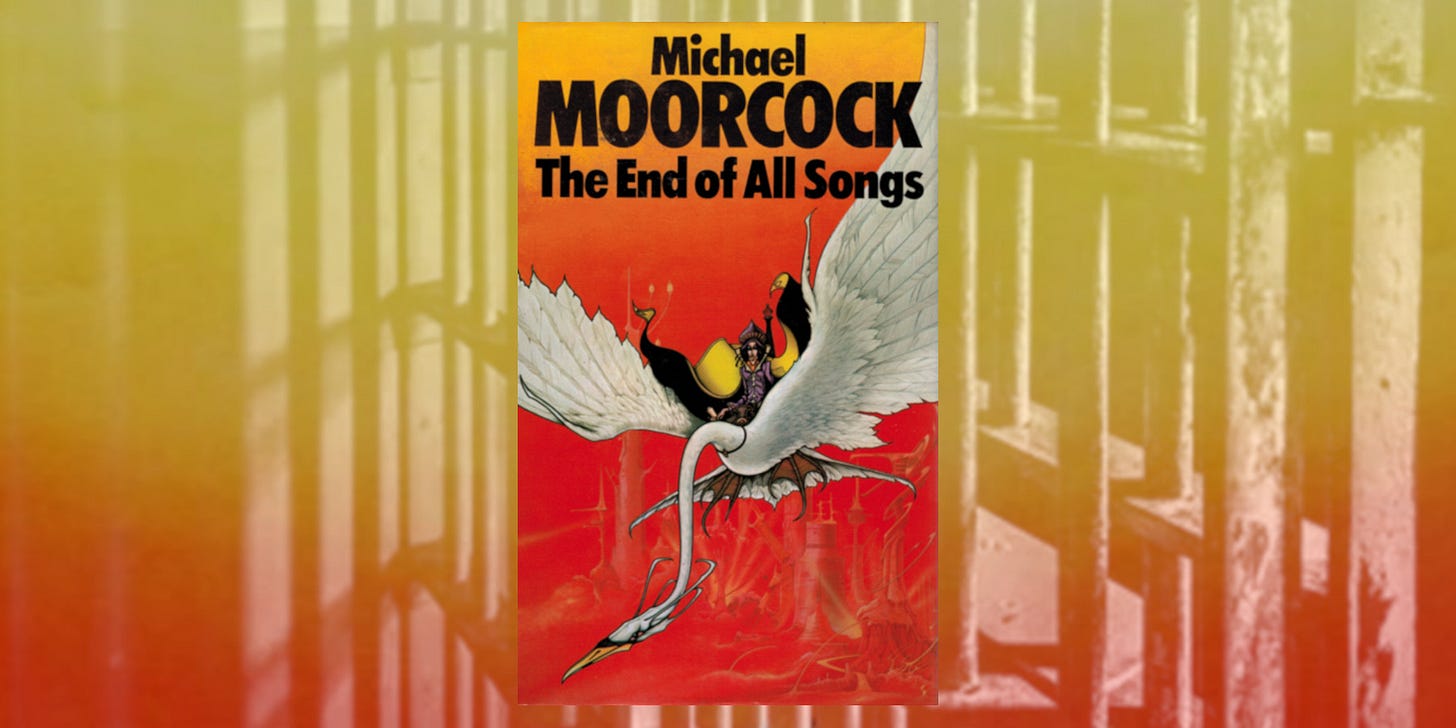Knowing You're a Prisoner
Reflections on imprisonment from Moorcock's wild romance at the End of Time
“Is the prisoner a prisoner because he lives in a cage or because he knows that he lives in a cage?” - Michael Moorcock, The End of All Songs
In a writing career full of unique and ground-breaking novels, Moorcock’s Dancers at the End of Time trilogy stands out as it is his only romantic comedy. It is simultaneously a Victorian novel published in three sequential parts, much as many 19th century novels were, and a work of weird science fiction set at the end of the universe. As the prologue of the first book, An Alien Heat, memorably puts it: this is “a story of Jherek Carnelian, who did not know the meaning of morality, and Mrs. Amelia Underwood, who knew everything about it.”
Those who dwell at the End of Time are amoral decadents, benefiting from incredible technology bequeathed to them by their ancestors that’s now far beyond their comprehension. They use power rings to summon up their fantasies, often inspired by wild misunderstandings of history (for they entirely misunderstand more or less everything that has ever happened). Their lack of comprehension for any concept of morality is tied to the absence of consequences to their actions - even if someone should happen to be killed, they can simply recreate their patterns with the power rings. They live in a waking dream where they can do anything... and thus, they are intensely and inescapably bored, seizing upon every visitor who arrives through space or time to stock up their ‘menageries’ and provide entertainment.
Into this strange world arrives Mrs Amelia Underwood, who has been plucked out of Victorian England by another denizen of the End of Time. She is understandably horrified by more or less everything she encounters. When an alien visitor reports that the universe is coming to an end and that the Earth will not last much longer, the people at the End of Time are unimpressed, having heard it all before, and the being is frozen and sent off to a menagerie. Amelia is horrified, crying out: “Let the poor creature go! Though he is neither human nor Christian, he is still one of God’s creatures and has a right to his liberty!” Intrigued, Jherek decides he will fall in love with her, and commit to not loving anyone else - an idea that his companions find fascinating and original!
There follows madcap adventures as the romance between Amelia and Jherek plays out in Victorian London, the Lower Devonian (when plants first spread onto land), and the End of Time. Through this love affair, Jherek gradually discovers the utterly alien concept of morality, while Amelia comes to see existence from a broader perspective without ever quite giving up her ethical grounding. If Moorcock’s lack of a religious upbringing hinders him slightly (he did not engage with his Jewish heritage until very late in life), he learned more than enough about Victorian Christianity from reading Charles Dickens, whom he channels here abundantly.
Thematically, the entire series raises questions about freedom and imprisonment. In the final book, the enigmatic Lord Jagged (whose mysterious scheming provides much of the engine of the plot) expresses the prevailing theme in the quote above: is what makes someone a prisoner their cage or their awareness of being trapped within it? We encounter this idea throughout the tale, via the various visitors to the End of Time who are kept in the menageries, through jails and prisons in Victorian London, and through the stifling tension Amelia feels as her love for Jherek grows yet she remains trapped in a loveless marriage to the dour Mr Underwood, to whom she is bound by her wedding vows.
While the elusiveness of freedom is a theme that recurs throughout Moorcock’s more than a hundred novels, The Dancers at the End of Time engages with the role of perception in our sense of being trapped, both physically and conceptually. Despite the incredible powers possessed by those at the End of Time, life there is imprisonment only to some within the menageries (including Amelia herself), while Jherek (briefly) lives within an actual prison and simply finds the experience intriguing, having no way of understanding the meaning of imprisonment. Likewise, we too evoke the name freedom to describe states of existence that paradoxically entail being trapped within our cultural and technological cages. As long as we do not see the walls, we can persuade ourselves that we are free.




Sounds fascinating and apropos of so much of the human experience. Makes me think of Bergson's observation that each individual life is an entire history, an entire evolution reaching back in time, rather than a continuation of the moment just passed. Time, in a way, is an accumulated pressure, a driving force. Meanwhile, culturally speaking, there seems to be a conceptual drift toward what you describe here: a complete lack of understanding narratives and how they impact one's life and the lives of those around us. Living moment to moment, folks are detaching from physical reality, from any sense of the impacts of their actions.